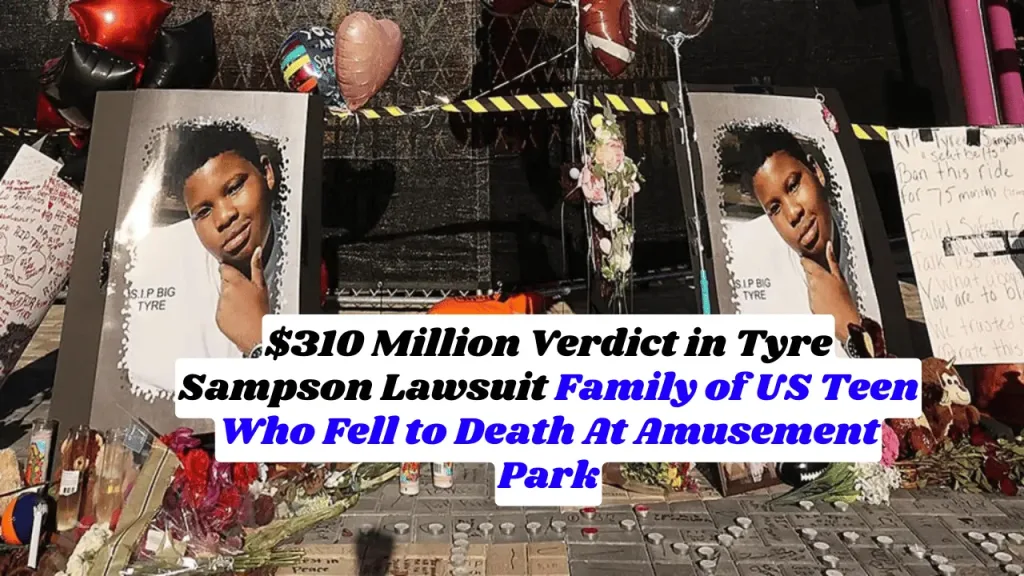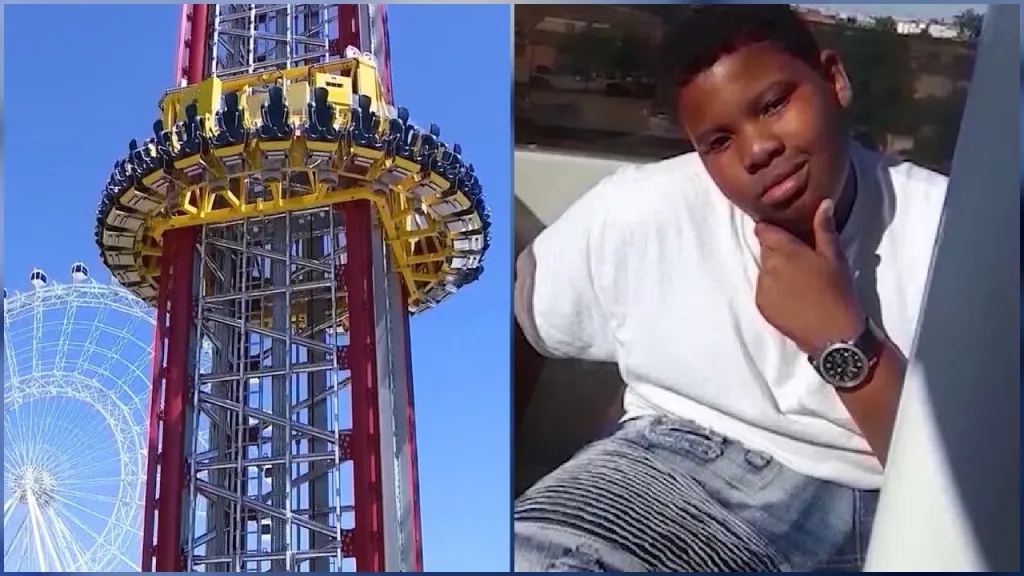$310 Million Verdict in Tyre Sampson Lawsuit Family of US Teen Who Fell to Death At Amusement Park
Florida jury awarded $310 million to the parents of Tyre Sampson, a Missouri teenager who tragically fell to his death from the Orlando FreeFall ride at ICON Park in 2022. The lawsuit, filed against the ride’s manufacturers and operators, highlighted the grave safety failures that led to the young teen’s untimely death. This significant verdict serves as a powerful reminder of the need for stronger safety protocols in the amusement park industry.
Table of Contents
Who Was Tyre Sampson?
Tyre Sampson was a 14-year-old honor-roll student and talented football player from St. Louis, Missouri. He was visiting Orlando during his spring break in March 2022 with his football team when the tragic accident occurred. Sampson had a bright future ahead of him, but his life was cut short after falling from the Orlando FreeFall, the world’s tallest drop tower ride at ICON Park. His death has since sparked a nationwide conversation about amusement park safety, particularly concerning weight limits, ride design, and corporate accountability.
When Did Tyre Sampson Pass Away?
Tyre Sampson passed away on March 24, 2022, after falling from the Orlando FreeFall ride at ICON Park, located in Orlando, Florida. He had exceeded the ride’s weight limit of 285 pounds, weighing 383 pounds at the time of the incident. The ride’s safety system, which relied on an overhead harness without seat belts, failed to properly secure him, leading to the fatal fall from a height of over 70 feet. The tragedy occurred after the ride’s restraint system was improperly altered, allowing larger riders like Tyre to board despite not being securely fastened.
The Tyre Sampson Lawsuit and Legal Battle
The lawsuit filed by Tyre Sampson’s parents, Nekia Dodd and Yarnell Sampson, was against Funtime Handels GmbH, the Austrian company responsible for manufacturing the FreeFall ride, and Gerstlauer Amusement Rides, the German company responsible for designing and inspecting the ride’s safety harnesses and seats. The lawsuit claimed that both companies were negligent in ensuring the safety of the ride and in failing to advise operators on weight restrictions, which contributed to Sampson’s death.
The lawsuit further alleged that the ride’s restraint system had been improperly altered, allowing larger riders, such as Tyre, to board without being securely fastened. In addition, Funtime Handels GmbH and Gerstlauer Amusement Rides were accused of failing to implement appropriate safety measures and procedures, which ultimately resulted in the tragic incident.
After a swift trial, the jury found the manufacturers liable for negligence, awarding Tyre Sampson’s parents a substantial $310 million in damages—$155 million for each parent. This verdict has been hailed as an important step in holding corporations accountable for the safety of their products, particularly in the amusement park industry.

What Was the Outcome of the Tyre Sampson Lawsuit?
The outcome of the Tyre Sampson lawsuit was a major victory for his parents and for advocates of ride safety across the country. The Florida jury determined that the companies responsible for the FreeFall ride had failed to prioritize safety over profits, ultimately resulting in the tragic death of a young boy. The $310 million verdict was split equally between Tyre Sampson’s mother and father, providing them with some measure of justice after their devastating loss.
Family attorney Ben Crump, who represented the Sampson family, stated, “This verdict is a step forward in holding corporations accountable for the safety of their products. The jury’s decision confirms that Tyre’s death was the result of blatant negligence and a failure to prioritize safety over profits.” The legal battle has brought attention to the broader issue of amusement ride safety and has sparked public outcry over the lack of stringent regulations.
Did Tyre Sampson’s Ride Get Taken Down?
Yes, the Orlando FreeFall ride was dismantled following Tyre Sampson’s death. The ride, which had been operating at ICON Park as the world’s tallest drop tower, was permanently shut down after the incident and the subsequent public backlash. Investigations into the ride revealed that the restraint system had been manually altered to allow larger riders to board, even though it violated safety protocols. This alteration contributed to the tragic fall that took Tyre’s life.
In addition to the ride’s dismantling, ICON Park and the ride operator, Orlando Eagle Drop Slingshot, reached settlements with state authorities. A settlement in 2023 saw Orlando Eagle Drop Slingshot paying $250,000 to the Florida Department of Agriculture for failing to operate the FreeFall ride in compliance with state regulations. The company was also prohibited from reapplying for a permit to operate the ride again.
Related Articles For You:
MacDonald’s Coffee Lawsuit Burn Pictures the Facts Behind the Controversies MacDonald’s Lawsuits

The Tyre Sampson Act: Legislative Change in Ride Safety
In response to Tyre Sampson’s death, the Florida state legislature passed the Tyre Sampson Act in 2023, a law aimed at tightening the safety requirements for amusement rides. The legislation introduced several key changes, including:
- Prohibition of unauthorized alterations to ride restraint systems.
- A requirement for detailed safety and operational documentation to be submitted to the state for approval.
- Expanded oversight by the Florida Department of Agriculture, with the authority to conduct unannounced inspections and establish minimum training standards for ride operators.
While the law is a step toward better safety, it also faced some criticism, particularly regarding companion legislation that shields records in active investigations from public disclosure. Critics argue that this could hinder transparency and prevent the public from accessing information about ride safety.
Legal Process and Timeline
The legal process surrounding Tyre Sampson’s death unfolded rapidly, with the lawsuit filed shortly after the tragedy. A jury trial took place in Florida, where the plaintiffs presented evidence of negligence by the ride manufacturers and operators. The trial was relatively swift, with the jury rendering a verdict within months of the filing. The $310 million award was a substantial payout, split between Tyre’s parents, and served as a symbol of accountability in the amusement park industry.
The trial’s speed and outcome were notable, as it was a significant example of corporate accountability in cases involving fatalities at amusement parks. This process highlighted the legal hurdles parents must cope with in such tragic circumstances and set a precedent for other similar cases in the future.
Impact on the Community and Tyre’s Legacy
Tyre Sampson’s death has had a profound impact on his family, the community of St. Louis, and the broader public. The tragedy has drawn attention to the safety protocols in place at amusement parks and led to public outrage over lax regulations. Tyre’s legacy is now tied to a broader movement to ensure safer amusement rides, with his parents pushing for legislative change and advocating for stricter safety measures.
Locally, the Sampson family has received widespread support, with many community members rallying behind their fight for justice. Tyre’s story has become a symbol of the need for reform in ride safety laws, and his death has catalyzed a broader discussion about how amusement parks operate and the importance of safety over profit.
Clarification of Legal Terms
When discussing legal cases like the Tyre Sampson lawsuit, it’s important to understand the following terms:
- Negligence: A failure to exercise the care that a reasonable person would in similar circumstances. In this case, the manufacturers and operators were found negligent for not ensuring the safety of the ride.
- Damages: Monetary compensation awarded to a party in a lawsuit. The $310 million awarded to Tyre’s parents was a form of damages meant to compensate them for their loss and hold the responsible parties accountable.
- Liability: Legal responsibility for one’s actions or omissions. The ride manufacturers were found liable for Tyre’s death due to their negligence.
State-Specific Safety Regulations: Florida
Florida has a comprehensive set of regulations that govern amusement park safety, administered by the Florida Department of Agriculture and Consumer Services (FDACS). These regulations cover a wide range of safety measures, including ride inspections, maintenance schedules, and operator training. In light of the Tyre Sampson case, Florida lawmakers have enacted new regulations, including the Tyre Sampson Act, which mandates stricter oversight and safety measures for amusement rides.
The legislation requires that all ride restraint systems be properly secured, and it prohibits unauthorized alterations to rides. The Florida Department of Agriculture now has increased authority to inspect rides and ensure compliance with these new regulations. The changes in Florida law are expected to serve as a model for other states to adopt similar measures.
Background Information on Amusement Ride Safety Standards
Amusement rides in the U.S. are regulated by various agencies, including the American Society for Testing and Materials (ASTM), which sets standards for the design, construction, and maintenance of amusement rides. These standards are critical for ensuring that rides are safe and that operators take necessary precautions to prevent accidents. The Tyre Sampson case highlights the failure of these systems, as safety protocols were not followed, and safety measures were altered to accommodate larger riders, putting everyone at risk.
The Importance of the Verdict and Legal Precedent
This $310 million verdict is significant not only for Tyre Sampson’s family but also as a message to the amusement park industry. It sets a legal precedent that companies must be held accountable for safety violations that endanger the public. The outcome of this lawsuit, combined with the passage of the Tyre Sampson Act, signals that there is growing awareness of the need for stricter safety measures in the amusement ride sector.
Ben Crump, the Sampson family’s attorney, emphasized, “We hope this case serves as a wake-up call for the entire industry to implement stricter safety measures and oversight to prevent such tragedies from happening again. Tyre’s legacy will be a safer future for riders everywhere.”
Conclusion: A Legacy of Change and Accountability
The tragic death of Tyre Sampson has undoubtedly left a void for his family and loved ones. However, the legal outcomes from the Tyre Sampson lawsuit, along with the introduction of new safety legislation, aim to ensure that his death was not in vain. The steps taken by lawmakers and the significant financial settlement awarded to his parents are crucial steps toward making amusement parks safer for future generations of riders.
By raising awareness and pushing for stronger regulations, the Sampson family hopes to prevent further tragedies and ensure that amusement parks prioritize safety over profits. The dismantling of the Orlando FreeFall ride and the passage of the Tyre Sampson Act are testament to their tireless efforts to bring about change in the amusement ride industry.
About the Author

Sarah Klein, JD, is a licensed attorney and legal content strategist with over 12 years of experience across civil, criminal, family, and regulatory law. At All About Lawyer, she covers a wide range of legal topics — from high-profile lawsuits and courtroom stories to state traffic laws and everyday legal questions — all with a focus on accuracy, clarity, and public understanding.
Her writing blends real legal insight with plain-English explanations, helping readers stay informed and legally aware.
Read more about Sarah
